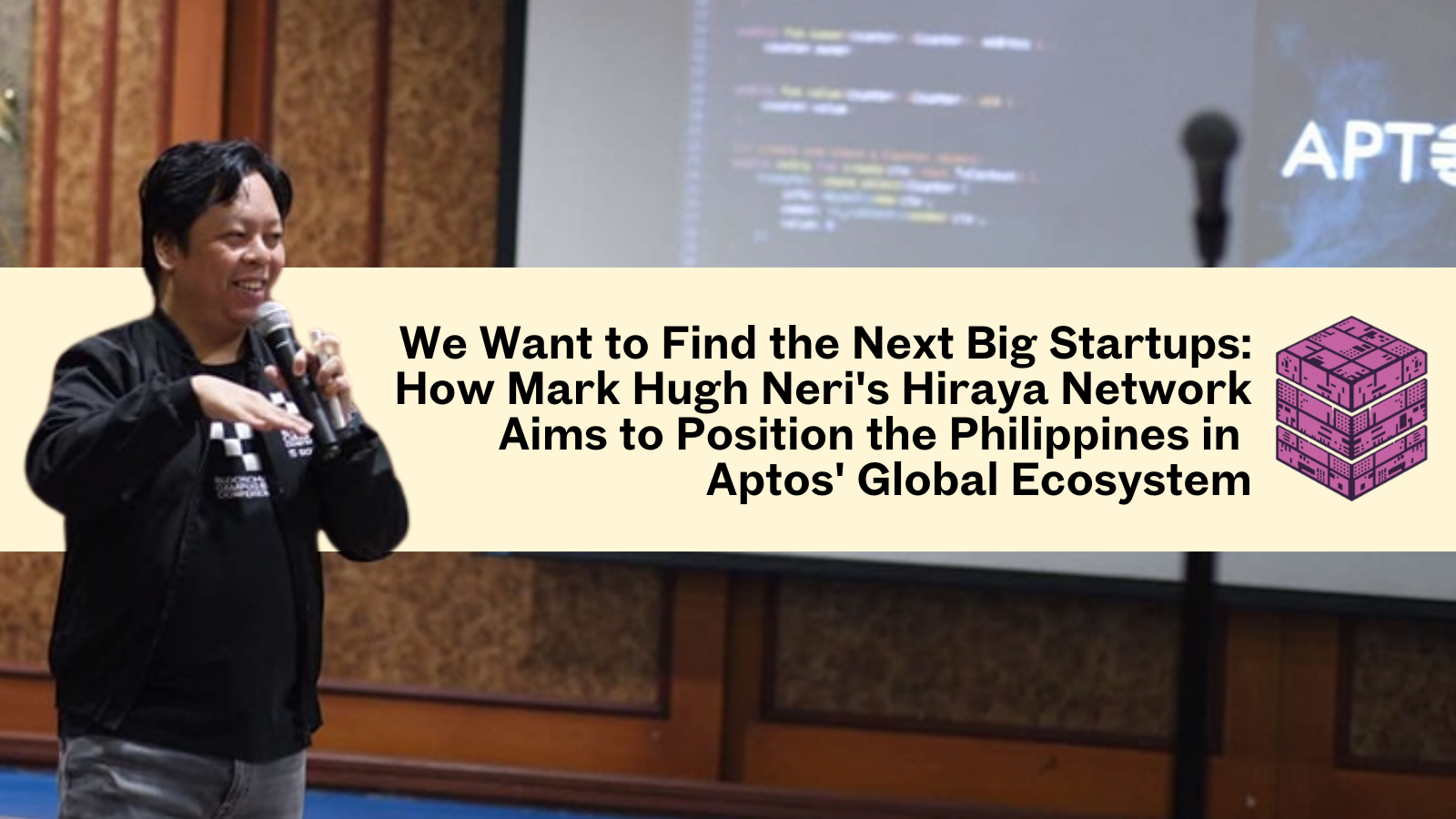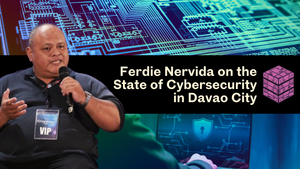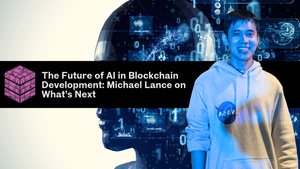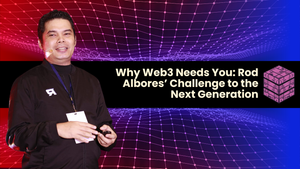When Facebook's crypto dreams died, the team regrouped to build Aptos. Now, Mark Hugh Neri is scaling that vision to boost the Philippines' Web3 legacy.
The name Hiraya means "fruit of one's dreams" in Filipino. For Mark Hugh Neri, also known as Sleep Build Run, that poetic choice reflects a practical mission: transforming Aptos' sophisticated Move programming language into accessible opportunities for Filipino developers.
One month into launching Hiraya Network as Aptos Labs' official Philippine hub, he's already running bootcamps and preparing developers to work on blockchain technology that Facebook's team originally envisioned, but now builds in the Philippines.
Neri's journey to creating Hiraya Network comes from witnessing blockchain's transformative potential firsthand as CTO of The BLOKC and co-founder of Selyo. But his approach differs markedly from typical Web3 evangelists who treat blockchain as a revolution requiring complete mindset shifts. Instead, Neri treats it as what it is: another technology stack that developers can leverage to expand their capabilities.
This pragmatic perspective drives Hiraya Network's strategy of demystifying Aptos for Filipino talent eager to compete on the global stage.
From Facebook's Ashes to Production-Ready Blockchain
Aptos distinguishes itself in the crowded blockchain landscape through its origins and technical architecture. Unlike the numerous Ethereum clones dominating the market, Aptos emerged from Facebook's ambitious cryptocurrency project.
"Facebook, right? Before, they were making their own cryptocurrency and blockchain. Unfortunately, at that time, they were doing it too early during that time. So, they were regulated and then later on, that project didn't push through. But of course, the people behind it, later on, they continued."
What makes Aptos particularly compelling for developers, according to Neri, is its production-ready scalability demonstrated during Japan's Expo 2025, where the network processed over 558,000 transactions and onboarded 133,000 new accounts in the first week.
"So, if we are looking for a blockchain that would replace the capability of our existing financial networks, so, Aptos is a candidate for that."
This real-world demonstration of capability aligns with Hiraya Network's mission to position the Philippines as a significant player in global Aptos development. Neri sees Japan's success as a blueprint that neighboring countries, including the Philippines, can replicate and eventually surpass.
The Strategic Importance of Move Programming Language
For developers considering Aptos, the learning curve for Move programming represents both a challenge and an opportunity. Unlike Solidity, which draws from JavaScript and feels familiar to web developers, Move requires a different mindset.
"It depends on the background of the developer. So, maybe that's why we see Solidity as easier. Because most of us, including myself, have a lot of background in web development."
Neri reframes this challenge as an advantage for Filipino developers willing to master Move early. While the global developer community remains heavily focused on Solidity and Ethereum, Move programmers have less competition and more opportunities to stand out in grant applications and job markets.
"For Move, if you're coming from Rust or similar languages, you'll probably find Move as an easier option than Solidity."
This strategic positioning allows Hiraya Network to offer Filipino developers a unique value proposition: gaining expertise in a sophisticated programming language before it becomes mainstream.
Building Community Through Personal Connection at Scale
Hiraya Network's approach to developer education emphasizes personal relationships over mass instruction. Neri maintains an open-door policy, making himself available to answer individual questions and challenges.
"As much as possible, I get to know who I'm teaching on a personal level. So, that's one of our approaches. Rather than students are just a name."
This philosophy, proven successful during his time building The BLOKC, now faces scaling challenges as Hiraya Network grows. Neri's solution involves creating a multiplication model where experienced community members mentor newcomers.
"My practice on dealing with students personally, that's what I impart to my current set of mentors. So right now, our cohorts, I've assigned mentors to students that have a little group of themselves that will cater to the questions on a personal level."
The testing ground for readiness involves setting challenges that push community members beyond their comfort zones. Neri believes practical experience trumps theoretical knowledge.
"You really won't know if you're not going to try. So from time to time, I'm throwing challenges. Even if you're an intern, even if you've been in the community for a long time. So I'm trying to challenge out of their comfort zone."
Filipino Tech Advantage in Global Blockchain Adoption
Neri identifies specific advantages that position Filipino developers favorably in the global blockchain ecosystem. The combination of technical proficiency and economic opportunity creates a compelling environment for Aptos adoption.
"Filipinos have the opportunity to make money. That's one. But I feel like they already know that. I'm not sure if it's positive or negative. But it depends on how you look at it."
Beyond economic incentives, Neri points to cultural factors that accelerate technology adoption among Filipinos, particularly younger generations who embrace emerging technologies quickly.
"Another item that we can include is Filipinos are very tech savvy. Since blockchain is an emerging tech, it's not very familiar to everyone. So when it comes to adoption, we're probably faster compared to others. Especially the younger generation."
This technological fluency, combined with English proficiency and global connectivity, positions the Philippines as an ideal hub for Aptos ecosystem development.
Bridging Web2 and Web3 Without the Hype
One of Hiraya Network's core strategies involves reaching Web2 developers without overwhelming them with Web3 terminology and concepts. Neri advocates for a transparent approach that focuses on practical benefits rather than revolutionary rhetoric.
"Some people isolate Web 3.0 to Web 2.0, which is probably not ideal, especially for Web 3.0. Because if you look at it, Web 3.0 is just another tech stack or technology that a developer can utilize."
This philosophy extends to user experience design, where Neri recommends hiding blockchain mechanics from end users.
"That's why when you're making apps or hackathons or ideatons, it's better if users don't know that it's a Web3 project. It's just a normal app as much as possible. It so happens that it uses Web3. Or a blockchain."
By emphasizing practical utility over ideological transformation, Hiraya Network appeals to pragmatic developers seeking to expand their skill sets without abandoning their existing expertise.
Balancing Innovation with Philippine Market Realities
Neri's approach to building Hiraya Network reflects hard-learned lessons about the gap between idealistic visions and practical implementation, particularly in the Philippine context.
"Actually, it's hard. But I think I've already graduated from being an over-idealist. I mean, I'm more practical now. If we're ever going to try new things, it's more on the realistic. Especially if your setting is the Philippines."
This realism shapes Hiraya Network's gradual rollout strategy, focusing on community building before attempting large-scale initiatives. Rather than launching with grandiose announcements, the team prioritizes establishing strong foundations with core community members.
"Right now, we're more on building the community first, establishing the core people that we're working with. And then, slowly but surely, we'll definitely try to onboard different projects to Aptos as well."
The measured approach reflects understanding that sustainable growth requires adapting global strategies to local contexts.
Vision for Philippine Blockchain Leadership
Neri's ultimate ambition for Hiraya Network extends beyond simple technology adoption. He envisions the Philippines producing globally recognized startups that emerge from the Aptos ecosystem.
"If we can help find the next... I'm not sure if I'll be super optimistic. The next big startups coming from the Philippines via Hiraya, I think that's a super legacy for Hiraya."
This vision encompasses both blockchain-native companies and traditional startups that leverage Aptos technology for competitive advantage. The goal isn't to create another development center, but to establish the Philippines as a source of innovation in the global Aptos ecosystem.
"We can make it big. We can put the Philippines on the map in terms of startups known as a global brand through Hiraya."
Success will be measured not just in individual developer achievements, but in the emergence of Philippine-founded companies that compete globally using Aptos infrastructure.
Hiraya Network represents more than another blockchain education initiative. Under Mark Hugh Neri's leadership, it's positioning itself as the bridge between Filipino technical talent and global Aptos opportunities.
By combining practical blockchain education with cultural resonance and personal mentorship, Hiraya Network aims to prove that the next generation of blockchain innovators can emerge from the Philippines, fulfilling the promise embedded in its name: transforming dreams into reality.











